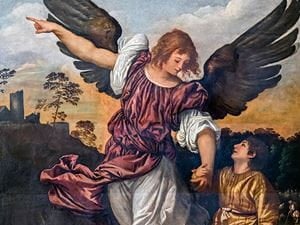
Public Domain
Michael. Gabriel. Raphael. These are probably the three most famous angels in the Christian world. They are also the three that most Christians would name as archangels. The names of the other archangel or other four archangels, depending on if a person believes there are four or seven archangels, are up for debate. Some people would name Jermiel, Uriel or Zarcheil as the other archangels. Others would list the remaining archangels as Saraqael, Barachiel or Phanuel. The status of Michael, Gabriel and Raphael, however, are rarely questioned.
Unfortunately, Raphael proves rather difficult for most people to locate in the Bible. The archangel Michael is mentioned five separate times in the Bible, and Gabriel is the most famous of any angel given that he is the one who announces the Immaculate Conception to Mary. A quick skim of the Scripture, however, shows that Raphael, an archangel given nearly as much focus and prestige as Michael and Gabriel, is nowhere to be found. This is because Raphael does not appear by name in the canonical Scriptures.The Bible was not always in the form most Christians today know and love. The order and number of books in the Bible has changed repeatedly throughout its long history. In fact, for the first three centuries or so of Christian history, there was no such thing as “the Bible.” It was not until Athanasius’ Easter letter of A.D. 367 that a Biblical canon was ever listed, and his proposed canon was not finalized for another two centuries. When the modern Biblical canon was finalized, there were a number of books that were excluded from Scripture for political and cultural reasons. The Acts of Paul and Thecla, for example, were seen as encouraging too much independence in women. The Gospel of John, of all books, was a source of contention given that it could be interpreted in a Gnostic fashion.
The men who decided on the final form of the Bible were content to have those books they excluded and named heretical disappear quietly from history. Unfortunately for them, some early Christians were rather attached to those stories and continued to pass them down. Some of these books would later be added back into the Bible to create a “more complete” version. The ancient shapers of the Bible also had no way of predicting exactly how voracious modern scholars and archeologists would be for biblical history of any kind. “Lost” books were often the subject of more study than canonical books. These lost, forgotten and excluded books were collectively named the Apocrypha, from the Greek word apokruptein or “hidden away.” It is in these books that Raphael’s name is found.
The angel Raphael is a main character in the apocryphal Book of Tobit. In Tobit, Raphael is sent to help Tobit and Tobit’s son, Tobias. Tobit is a righteous Israelite who was blinded by bird droppings. Raphael claims to be Tobit’s kinsman, Azariah, and offers to help Tobias reclaim money Tobit deposited in Media. Along the way to the city, the disguised Raphael tells Tobias that he has the rightful claim to the hand of a woman named Sarah who is “sensible, brave, and very beautiful.” Sarah, however, has been cursed by a demon and all her suitors have died on their wedding night. Raphael tells Tobias to ask for Sarah’s hand anyway, and then instructs Tobias on how to exorcise the demon. Tobias follows Raphael’s instructions, and Raphael chases down and binds the fleeing demon. The newlyweds and the disguised angel then return to Tobit where Raphael heals Tobit and finally discloses his identity. He declares that he is not Azariah the Israelite but “Raphael, one of the seven angels who stand ready and enter before the glory of the Lord.”
The Book of Tobit is included in Catholic and Orthodox Biblical canons, but it is not the only apocryphal book where Raphael appears. Raphael also appears in the Book of Enoch, another Old Testament apocryphal book. Enoch has reached almost mythical status because it is so different from many of the other books of the Old Testament. Enoch describes the archangels, the “holy sons of God,” fallen angels and giants called the “Nephilim.” The book has been a source of fascination for doomsday predictors, mystics and scholars alike. It is also the book that repeatedly singles out Michael, Gabriel, Raphael and Phanuel as especially important or powerful angels.
Enoch remains a commonly cited source for people who are interested in angels and archangels, but one theory states that Enoch was more than a prophet who visited heaven in visions and dreams. Some Mormons believe that Enoch was actually the archangel Raphael himself. Given how Raphael disguised himself for weeks while traveling with Tobias, it is not impossible that the angel might have taken on a mortal façade previously. He is one of, if not the only, angel to ever be identified as portraying himself as a mere man.
The archangel Raphael has become central enough to many Christians that people are stunned to learn that he is never referred to by name in the canonical Bible. Instead, he appears in apocryphal books such as Tobit and Enoch and in early Christian, non-Biblical writings. Despite this, he occupies the same space in many Christian hearts as Michael and Gabriel. He is heralded as the angel of healing and the angel who will sound the trumpet that announces Judgement Day.
For all his cultural importance to Christianity, Raphael is not a major character in the stories contained in the Bible. At least, he does not appear to be. Given his apparent propensity for disguising himself as a mortal man, Raphael could actually be hiding in every book in the Bible, and modern readers would be as oblivious to the angel as the mortals who actually stood beside him thousands of years ago.

